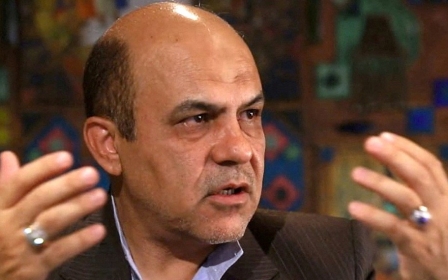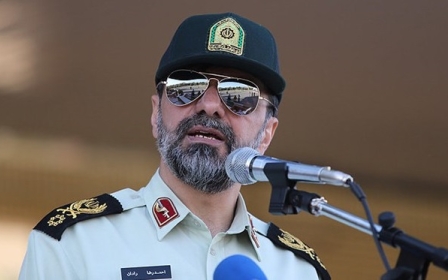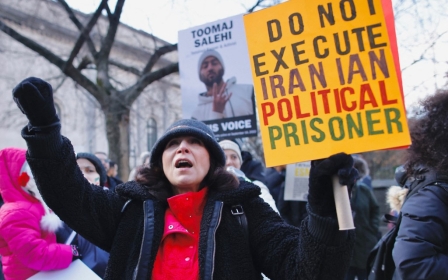Alireza Akbari: Iran condemned for 'barbaric' execution of British dual citizen
The execution of British-Iranian dual citizen Alireza Akbari has drawn strong condemnation from western governments and human rights advocates.
Akbari, 61, who once served as Iran's deputy defence minister, was hanged on Saturday after being sentenced to death for spying for the UK, a charge he denied.
Sources told Middle East Eye that Akbari's case was political and that he was likely a victim of efforts to oust close ally Ali Shamkhani, Iran's secretary of the Supreme National Security Council.
'This was a callous and cowardly act, carried out by a barbaric regime with no respect for the human rights of their own people'
- UK Prime Minister Rishi Sunak
His official charge was "corruption on earth and harming the country's internal and external security by passing on intelligence", the judiciary's Mizan Online website said. It did not say when or where the execution took place.
UK Prime Minister Rishi Sunak said he was "appalled" by the news of the execution, adding: "This was a callous and cowardly act, carried out by a barbaric regime with no respect for the human rights of their own people."
New MEE newsletter: Jerusalem Dispatch
Sign up to get the latest insights and analysis on Israel-Palestine, alongside Turkey Unpacked and other MEE newsletters
Foreign Secretary James Cleverly said the "barbaric" execution "will not stand unchallenged," before announcing sanctions on Iran's prosecutor general.
Cleverly confirmed that Iran's most senior British-based diplomat, charge d'affaires Mehdi Hosseini Matin, would be summoned for the UK government to "make clear our disgust". He later announced that Britain would temporarily withdraw its ambassador from Iran and consider what further actions it might take.
The British ambassador had been summoned earlier on Saturday by the Iranian foreign ministry over what it called London's "meddling in Iran's national security realm", according to the state news agency IRNA.
The United State and France joined the UK in condemning the "barbaric" execution. The US Ambassador to London Jane Hartley called it "appalling and sickening," on Twitter.
The French foreign ministry summoned Iran's charge d'affaires in Paris and warned him "that Iran's repeated violations of international law cannot go unanswered, particularly with regard to the treatment of foreign nationals whom it arbitrarily detains," the ministry said in a statement.
Political motives
The Iranian chapter of Amnesty International called the execution yet another example of Iranian authorities' "abhorrent assault on the right to life".
"The use of the death penalty is appalling under all circumstances," the group said on Twitter.
It added that it was "particularly horrific" in Akbari's case due to "violations he revealed he was subjected to in prison, including torture and other ill-treatment" and "being forcibly administered chemical substances and being held in prolonged solitary confinement which caused him great distress".
Akbari was forced to make recorded confessions repeatedly, Amnesty Iran said, which were later used in court during his trial.
On the face of it, Akbari enjoyed the kind of career many Iranians loyal to the Islamic Republic would dream of having.
In the late 80s, he served in the military’s general staff, overseeing information and operations. Between 1998 and 2003, Akbari was a deputy to Iran’s then-defence minister Ali Shamkhani, who is currently secretary of the Supreme National Security Council.
He also served in Iran’s Expediency Council’s Strategic Studies Centre and had a reputation as someone with fantastic ties with several influential officials.
He emigrated to the UK and obtained British citizenship around 10 years ago but continued to frequently return to Iran and meet his friends in the government and establishment. He was arrested in 2019.
'It is likely that Akbari is the victim of a power struggle'
- Iran-based analyst
Despite charges of espionage and handling sensitive information to the UK government, Akbari’s record does not particularly resemble that of a man loyal to Britain.
His posts on his Facebook page paint him as a critic of the 2015 nuclear deal with the US, UK and other world powers. He also criticised moderate former president Hassan Rouhani for implementing the recommendations of the Financial Action Task Force, an intergovernmental group that combats money laundering and terror financing.
Akbari denied the charges of espionage and has even been heard in an audio recording obtained by the BBC saying there is "no evidence" against him.
A political analyst, speaking anonymously for security reasons, told MEE: "It is likely that hardliners who are against Shamkhani want to remove him from his powerful position".
Shamkhani has been secretary of the Supreme National Security Council since 2013.
"It is likely that Akbari is the victim of a power struggle," the Iran-based analyst added.
A source close to the conservatives agreed that the government’s principlists, a group commonly known as the hardliners, dislike Shamkhani and have wanted him out ever since Ebrahim Raisi’s presidency began in 2021.
Middle East Eye delivers independent and unrivalled coverage and analysis of the Middle East, North Africa and beyond. To learn more about republishing this content and the associated fees, please fill out this form. More about MEE can be found here.




